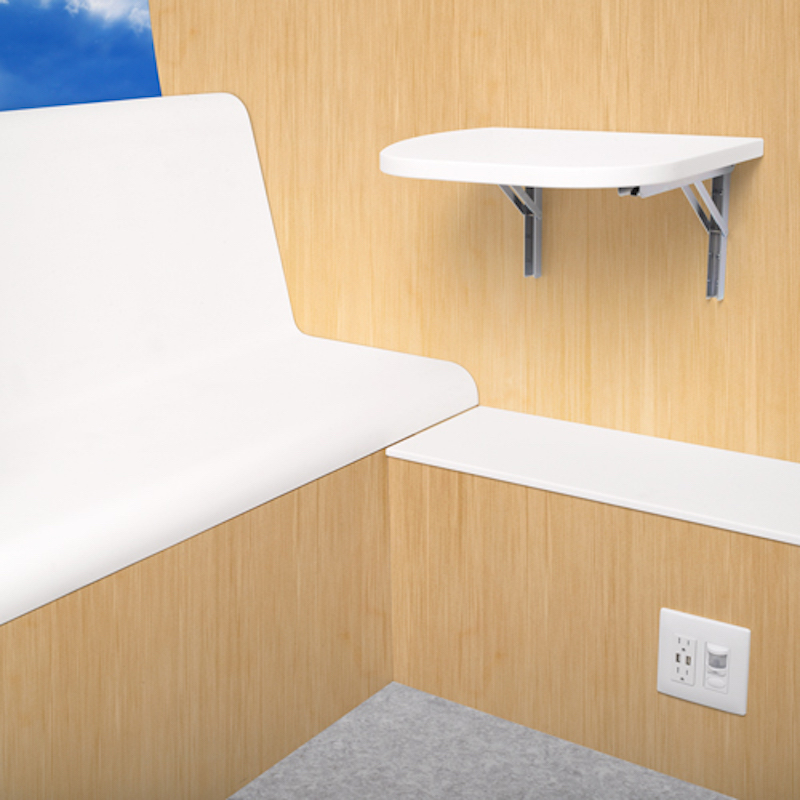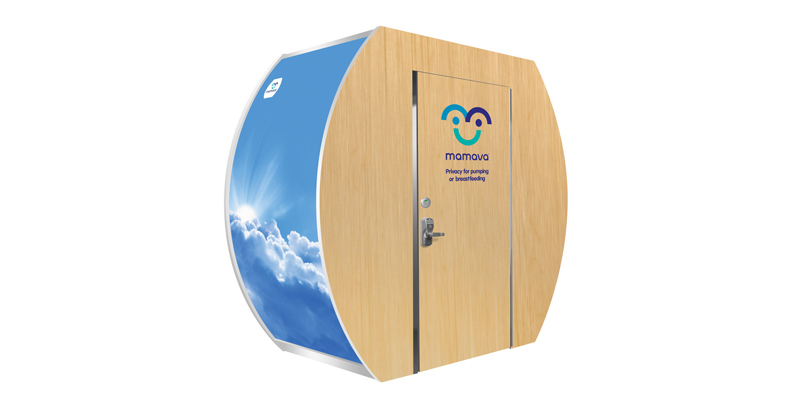When Mamava founders, Sascha Mayer and Christine Dodson, developed the concept for a mobile lactation unit, it came more from necessity than creativity. As working mothers, traveling without their nursing infants, both encountered issues with pumping in a safe, comfortable space. They noticed that while breastfeeding is strongly encouraged for mothers, accommodations to do so are somewhat lacking.
"We knew we could find a flexible, affordable solution to this problem," said Mayer. "We wanted to create something that was affordable yet easy to place, easy to clean, and provides safety and privacy for moms."
Since its conception in 2006, the Mamava lactation pod has undergone several changes in design. Shortly after partnering with Konrad Prefab, which specializes in prefabricated architectural environments, the sleek, modern shape was born. David Jaacks, owner of Konrad Prefab chose a mix of ALPOLIC® materials (timber series wood grain finish and Graphic-AL composite) for the body of the lactation suite based on previous fabrication experience.
"Throughout my career, I’ve used all kinds of products for retail design, environmental spaces, and trade show exhibits. When Mamava and I talked through the concept and settled on a design, I chose ALPOLIC® because it’s easy to work with, durable, yet lightweight and flexible," said Jaacks. "We could also print on it to customize the unit for the buyer, so it was all the things we really needed."

Jaacks manufactures the units in Konrad Prefab’s Springfield, VT facility, and ships the components to the end user in sections for on-site assembly. All necessary tools and instructions are included, and he estimates even a novice can construct a unit in less than three hours. To date, nearly 300 units can be found across the nation in airports, offices, sports arenas, conference centers, and government and military buildings.
Complete with LED lighting, motion sensors, and air circulation fans, the Mamava lactation suite provides businesses with a cost effective option for compliance with the Fair Labor Standards Act, which requires a private space (that is not a bathroom) for nursing mothers.
The idea for Mamava may have come from personal struggles, but the movement it created is a direct result of a digitally connected society. Mamava understands its users, so the lactation suites are accessible via an app that allows users to identify pods in their area (airport, sports arenas, malls,) and then reserve their time slots. Electronic sensors on the units lock and unlock using the phone app so privacy and availability are assured.
"Millennial moms helped push this initiative," said Mayer. "They are helping keep up this momentum through social media, and we are very excited about the opportunity this provides for constructive discussion."
To learn more about the partnership between Mamava, Konrad Prefab, and ALPOLIC®, visit www.alpolic-americas.com/mamava.
Related Stories
| Aug 11, 2010
Proposed EPA regulations threaten thousands of jobs, says Portland Cement Association
A proposed hazardous air pollutant regulation for the cement industry undermines the balance between environmental protection and economic viability, according to statements the Portland Cement Association (PCA) is issuing this week at a series of public hearings.
| Aug 11, 2010
Construction employment shrinks in 319 of the nation's 336 largest metro areas in July, continuing months-long slide
Construction workers in communities across the country continued to suffer extreme job losses this July according to a new analysis of metropolitan area employment data from the Bureau of Labor Statistics released today by the Associated General Contractors of America. That analysis found construction employment declined in 319 of the nation’s largest communities while only 11 areas saw increases and six saw no change in construction employment between July 2008 and July 2009.
| Aug 11, 2010
Skanska, Turner most active in U.S. hotel construction, according to BD+C's Giants 300 report
A ranking of the Top 50 Hotel Contractors based on Building Design+Construction's 2009 Giants 300 survey. For more Giants 300 rankings, visit http://www.BDCnetwork.com/Giants
| Aug 11, 2010
Architecture Billings Index bounces back after substantial dip
Exhibiting a welcome rebound following a 5-point dip the month prior, the Architecture Billings Index (ABI) was up almost 6 points in July. As a leading economic indicator of construction activity, the ABI reflects the approximate nine to twelve month lag time between architecture billings and construction spending. The American Institute of Architects (AIA) reported the July ABI rating was 43.1, up noticeably from 37.7 the previous month.
| Aug 11, 2010
Gilbane, Whiting-Turner among nation's largest university contractors, according to BD+C's Giants 300 report
A ranking of the Top 50 University Contractors based on Building Design+Construction's 2009 Giants 300 survey. For more Giants 300 rankings, visit /giants
| Aug 11, 2010
70% of Qualified Trade Association Members Attain “Green Brick Specialist” Designation in Comprehensive Training Program
The Brick Industry Association (BIA), the national trade group representing distributors and manufacturers of clay brick and suppliers of related products and services, has announced that 70% of its eligible members have passed the industry’s first-ever online training program, “Sustainability/Green Building Design and Brick.”







